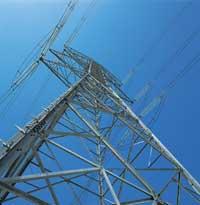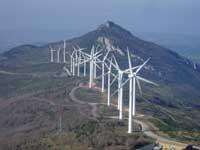Appliances / Appliances Appliances Appliances
2009/09/20 Lakar Iraizoz, Oihane - Elhuyar Zientzia

So without going to the imagination, experts in electricity, like the Irish Tom Raftery, predict that the future will be like this. It will be the next generation of electricity, electricity 2.0. In addition to the dishwasher, all appliances can work in this way. Yes, for all this to be possible, they must be smart, both appliances and electrical networks.
What does it mean to be intelligent? Well, in this case, the smart grid will send together with the electricity itself information about the amount of electricity that is in the network at every moment, the price of electricity, etc. Smart appliances, for their part, will be able to read and act accordingly. And all this automatically, without the intervention of the users.

Along with electricity, information about the current price, the amount of electricity in the network, etc. from the electric towers (Photo: REE).
Science fiction no, future possible
To those who have not heard of it may seem science fiction the subject of smart electricity. But there seems to be many options for electricity to go out there in the future. In short, it is a way to regulate the amount of electricity that is being consumed at every moment.
At present there are several companies that carry out this type of actions through the so-called cutting contracts, which have agreed with the entities selling electricity to put in place the apparatus and machines of the company when the entities give them their authorization and, on the contrary, they will paralyze when they receive the order to do so. In return, of course, they pay much less the electricity consumed.
However, when the electric grid becomes intelligent, this regulation will be done automatically and will be carried out by all those who have smart appliances. But, why regulate it? Those who bet on it consider it a good way to avoid problems between the electric grid and the increasingly abundant renewable energies, wind and photovoltaic.

Many washing machines will work when there is much wind and less when it is low (Photo: Gamesa).
Two of the characteristics of the current electrical networks, in some way, hinder the indiscriminate growth of renewable energies. On the one hand, the network does not store electricity, so at every moment you have to generate the necessary electricity for consumers. No more. On the other hand, with the aim of promoting renewable energy, either the electricity coming from renewable roads is not regulated, but all that is generated is integrated into the network.
Of course, this does not control when electricity is produced in wind and photovoltaic parks; the days of sun and wind are very much produced and when there is little, little. Those who control the electricity grid generate electricity through other sources of electricity that have not been generated by wind and photovoltaics.
However, if the smart power grid also manages to regulate consumption, it is much easier to balance consumption and generation, and also greatly facilitates the transfer of wind and photovoltaic energy. In short, many washing machines will work when there is much wind and less when there is little.
Published in 7K.

Gai honi buruzko eduki gehiago
Elhuyarrek garatutako teknologia




